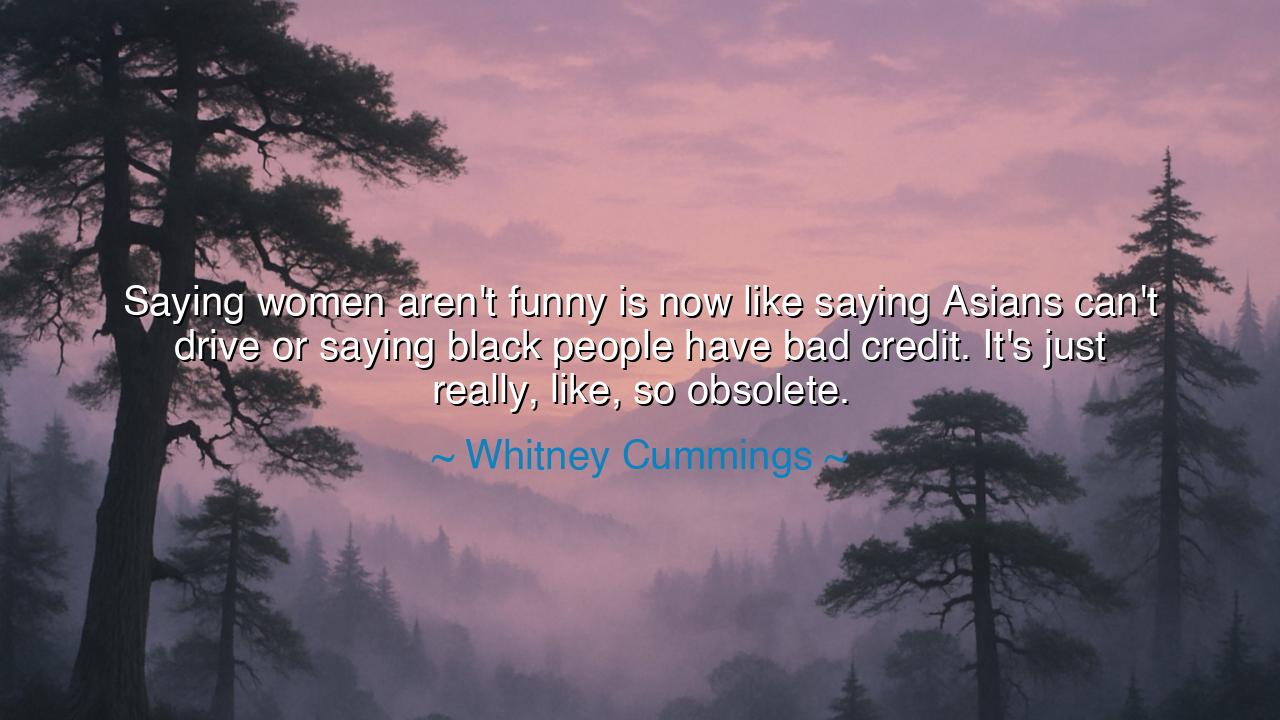
Saying women aren't funny is now like saying Asians can't drive
Saying women aren't funny is now like saying Asians can't drive or saying black people have bad credit. It's just really, like, so obsolete.






“Saying women aren’t funny is now like saying Asians can’t drive or saying black people have bad credit. It’s just really, like, so obsolete.” — thus spoke Whitney Cummings, a voice of sharp wit and fearless truth, whose words carry the weight of both humor and revolution. In this declaration, she does not simply defend comedy; she defends the evolution of human understanding itself. Beneath her laughter lies the roar of progress — the recognition that certain ideas, once spoken without thought, now stand exposed as relics of ignorance. Her words are a mirror to the times, reflecting how far society has come, and how far it still must go.
To understand this quote, one must first understand the struggle of women in comedy, that sacred arena where truth and laughter meet. For centuries, humor was claimed by men — the jesters of courts, the playwrights of the stage, the stand-up performers of smoke-filled clubs. The woman who dared to make the crowd laugh was treated as an anomaly, a curiosity. The notion that “women aren’t funny” became one of those cruel myths whispered as fact, a lazy disguise for fear — fear of women who could speak truth boldly, who could use laughter as both weapon and light. In Whitney Cummings’ time, that myth had already begun to crumble, yet she names it for what it is: obsolete — a fossil of prejudice preserved in the dust of an ignorant past.
Her comparison to racial stereotypes — “Asians can’t drive, black people have bad credit” — is no accident. It is deliberate, and cutting. By placing these old slurs beside the claim that “women aren’t funny,” she reveals their shared essence: the absurdity of prejudice. For all such sayings, whether about gender or race, are born not of truth but of fear — fear of difference, fear of equality, fear of power in unexpected hands. Just as society once chained its members by color or creed, so too did it chain women by expectation. The battlefield of comedy, then, becomes not just a stage, but a symbol — a space where equality is tested through laughter, where the human voice proves its worth by daring to speak freely.
Consider the story of Lucille Ball, that great pioneer of television comedy. In the 1950s, at a time when women were expected to smile quietly beside their husbands, she dared to build a career by making the world laugh — not as a supporting character, but as the star. Many dismissed her at first; they said a woman’s humor could never reach men, that her comedy was “domestic” and “small.” Yet Lucille Ball’s genius shattered every expectation. Her show, I Love Lucy, became one of the most beloved in history, watched across generations. In her laughter, the world saw something universal — that joy and absurdity know no gender. She did not just make jokes; she rewrote the story of what women could be.
Cummings’ words arise from this lineage — from the countless women who fought to claim their voices in art, politics, and life. When she calls the belief that “women aren’t funny” obsolete, she speaks as a herald of the new age — an age where talent is measured not by gender but by truth. In this sense, her statement is not only about comedy; it is about human progress. Every generation sheds old prejudices like dead skin. The claim that women cannot be funny, like the belief that one race is superior to another, belongs to a time before awakening — a time when the narrow-minded mistook their own fear for wisdom.
There is also humor in her phrasing — the lightness of irony that only a true comedian can wield. She mocks the outdated belief not with rage, but with laughter, for laughter itself is the most powerful weapon against ignorance. To laugh at prejudice is to rob it of its power. Her words remind us that mockery, when aimed at injustice, becomes a form of justice. The wise know that some truths cannot be shouted; they must be spoken with a smile, disarming the stubborn hearts that still cling to the past.
Let this, then, be the lesson: that every outdated idea must one day be named for what it is — a relic, unfit for the living mind. To cling to old prejudices is to deny life’s natural evolution. Whether in art, work, or understanding, we must learn to recognize when the world has changed — and to celebrate it. Respect does not diminish humor; it strengthens it. True comedy, as Whitney Cummings shows, is not cruelty but courage — the courage to speak truth in a way that opens, not wounds, the heart.
Thus, her words stand not merely as a defense of women’s humor, but as a declaration of the age we now live in — an age where equality, intelligence, and laughter rise hand in hand. The myths that once divided us have lost their power, and those who still repeat them only reveal their own irrelevance. As Whitney Cummings reminds us, the past’s narrow voices are fading — and in their place, a chorus of new ones, bold and diverse, is rising. The laughter of that chorus — unbound, unafraid, and unstoppable — is the sound of progress itself.






AAdministratorAdministrator
Welcome, honored guests. Please leave a comment, we will respond soon